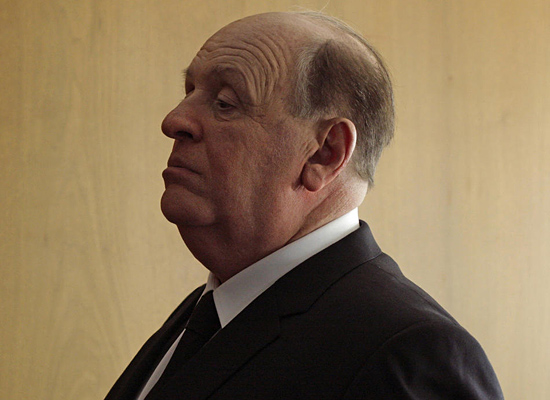Directed by Sacha Gervasi
Written by John J. McLaughlin
USA, 2012
It is, perhaps, odd to consider the thought of Alfred Hitchcock in love. Lusting after women, blondes especially, was one of his specialties, as expressed in such classics as Vertigo and To Catch a Thief, though the desire was expressed by far more attractive leading men. But the Master of Suspense, the cinematic figure so famous his silhouette was enough to remind audiences of who lay behind the shadows, in love? It feels like a stretch; if Walt Disney was the pop-culture figure who most reminded you of your kindly old uncle who’d tell you stories on the porch until you nodded off to sleep, then Alfred Hitchcock was the mad old uncle who delighted in scaring the pants off his young relatives with a scary story told around a bonfire. And yet, such a love story is at the core of Hitchcock, about how the making of Psycho dovetailed with Hitchcock being forced to realize how important his wife truly was.
Anthony Hopkins stars as Hitchcock, known to his friends and close colleagues as Hitch. (Just over 20 years since he played one of the most memorable screen villains, it’s fitting to see Hopkins move, kind of, behind the camera to play one of film’s most indelible faces associated with terror.) After the mid-range success of North by Northwest, he wants to do a film that feels vital, a film that reminds him why he got in the business in the first place. He finds a true-crime novel called Psycho, about a serial killer named Ed Gein who was extremely close with his mother and had a predilection for wearing women’s clothing. The story inflames Hitch’s imagination, so he begins making the film out of his own pocket, after Paramount Pictures refuses to spend any more money than it needs to distribute a film they find overly trashy and disturbing. As the shoot continues, Hitchcock unravels, worried that his longtime collaborator and wife, Alma (Helen Mirren), is two-timing him with a slick author (Danny Huston) and he can’t confront her directly.
Putting Hopkins and Mirren in a movie together means they could end up reading the phone book, but it would still be charming. Though the script by John J. McLaughlin (based on the Stephen Rebello book Alfred Hitchcock and the Making of Psycho) sometimes relies on pat and overly simplistic statements through dialogue, Hopkins and Mirren are so gifted that they make you forget or ignore the script’s failings. (That said, Mirren’s showcase scene, where Alma stands up to Hitch and makes it clear how much she’s sacrificed for his career, feels less like a scene that naturally progresses from its predecessor and more like an Oscar submission tape. It’s a very well-acted Oscar submission tape, but still.) They’re ably supported by character actors like Huston and the always welcome Michael Stuhlbarg as Hitch’s agent, as well as Scarlett Johannson and Jessica Biel as the lead actresses in Psycho, Janet Leigh and Vera Miles, respectively. And though he has far less to do, James D’Arcy deserves credit for his disturbingly accurate impersonation of Anthony Perkins. However, D’Arcy’s minimal screen time speaks to Hitchcock’s most galling problem: it’s not long enough.
Too often, movies suffer from not knowing when or how to end, dragging things out for no good reason. Hitchcock, as directed by Sacha Gervasi, is a compact 100 minutes, with little fat to be trimmed. But it could’ve benefited from being roughly 30 minutes longer, if only to properly balance the time Hitchcock spent making what is now considered one of the greatest American horror films ever, despite at the time being seen as a cheap step down for a cinematic genius. As it stands, Hitchcock leans heavily on the Hitch-Alma marriage, in the middle of a languid rough patch, as he all but drools over Leigh and other young female stars. Alma claims to be writing with that clearly caddish author; however, Mirren does an even better job in her scenes with Huston, letting her eyes do the work as opposed to any unsubtle dialogue. It’s not that this aspect of Hitchcock’s life isn’t fascinating; the making of Psycho is equally compelling, and a film that more fully tackled both of these warring elements would be better for it.
Hitchcock is, for a movie about a man trying to titillate and frighten audiences with prurient content, something of a lark, a glib and enjoyable trifle with a heartwarming center. A gutsier movie might’ve shown us the legitimate struggles Alfred Hitchcock had in making the film that would one day define his filmography. The movie we have is at least willing to tease and hint at the day-to-day foibles of a film in production, circa 1960. But if Hitchcock has succeeded in any way, it’s that the first thing you’ll want to do after you leave is watch Psycho all over again, to see how Hitchcock conjured up movie magic to make us scream at the very thought of taking a shower.




